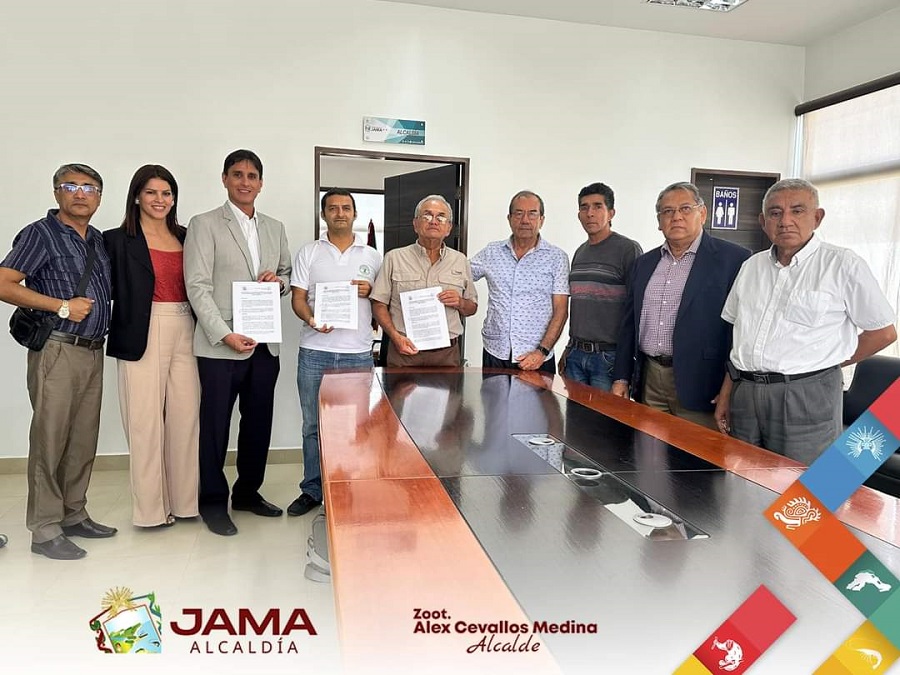30 Nov 2024

Agria
Assurance pour Animaux
Jama is a coastal canton in the province of Manabi, Ecuador with an area of 575 km2, its coasts are bathed by the Pacific Ocean and an extensive ancestral history where one of the most import

The Jama Canton for its extension is one of the smallest and youngest of the province of Manabi, its name would mean "small iguana" and comes from the Jama-Coaque culture, since the time of the Spanish conquest stood out for its important natural resources and that today its forest area has decreased by 55%, for this reason the authorities in their struggle for the protection of forests created the Area of Conservation and Sustainable Use (ACUS) of Northwestern Manabi with a total of 206. 000 hectares in 4 cantons (Pedernales, Jama, San Vicente and Sucre).
The ACUS connects these areas to guarantee the genetic diversity of species and, in addition, to guarantee water to the communities, since Manabí is one of the two provinces in continental Ecuador that does not depend on the Andes Mountains for its water supply, but on its own watersheds.
This area of conservation and sustainable use includes 8 types of ecosystems that year after year decreases in extension due to the lack of alternatives that are not linked to extrativism.
Factors such as climate, ecosystems, and other natural conditions present in the canton favor the diversity of species. Regarding the flora, it has lush vegetation such as: epiphytes and climbers, guarumos, balsa, apple, red, mamey, guava, coconut and aguacatillo, among others.
According to the International Union for Conservation of Nature (IUCN), there is threatened terrestrial and marine biodiversity:
According to research conducted by Global Forest Watch (2019), tree cover loss is identified on a year-by-year basis, defined as the replacement of vegetation at stand level greater than 5 meters. It should be noted that within this research "forest cover loss" is not the same as "deforestation": forest cover loss includes changes in both natural and planted forest, and need not be human-caused.
Making an analysis of the data provided, in Jama canton there is evidence of a loss of 3.38 kha (kilohectare) of tree cover from 2001 to 2019, which is equivalent to an 8% decrease in tree cover since 2000.
The COVID-19 pandemic is driving deforestation in forests and protected areas. Most people in communities surrounding these areas live on a meager daily income, due to the economic crisis people are likely to feel the need to encourage hunting of wildlife species for sale and consumption and illegal logging is at an all-time high and unchecked by authorities, a situation that may disrupt established livelihoods.
Environmental preservation strategy in the short, medium and long term.
Through Ministerial Agreement MAAE-2021-018, the Zero Carbon Ecuador Program (PECC) is established and through Ministerial Agreement MAATE-2023-053, the Technical Standard that establishes the Compensation Scheme for Greenhouse Gases in Ecuador is established.
At the national level (Ecuador) according to the PECC more than 3 million carbon credits are needed, but to date there are no registered projects that cover a low percentage of this need, due to the duration of the development of such projects (minimum 12 months) and the figure can easily be doubled to meet the European Community Regulation on BORDER CARBON ADJUSTMENT MECHANISM (EU-2023-956) with a deadline of December 31, 2025.
A great opportunity arises that makes known the private company (Green Ecuador S.A.) in order to provide alternatives to the protection of nature and the fight against global warming with triple impact projects (economic, social and environmental) to the Decentralized Autonomous Government of the canton Jama, receiving with total openness on the part of the maximum authority Zoot. Alex Cevallos Medina as Mayor and his work team, the unconditional support of Mr. Eulaldo Loor, owner of the Lalo Loor Dry Forest Reserve, the legal support of Dr. Jorge Garay and the vision of Econ. Jorge Loor Zambrano and his team.
Thus, a LETTER OF INTENTION OF COLLABORATION BETWEEN THE AUTONOMOUS DECENTRALIZED MUNICIPAL GOVERNMENT OF CANTON JAMA AND GREEN ECUADOR SA is signed, where its objectives are described:
1. Seek mechanisms to expedite the development of the carbon sequestration project in the tropical dry forest ecosystem of the Jama Canton.
2.Develop cooperation and information exchange to facilitate the proper development of the project.
3. Commit to sign future agreements, alliances or associations that will allow an efficient and transparent management of the project.
4.Promote through the Association of Municipalities (the alternative of generating Carbon Equivalent Units (CEU's) for international trade.
The project in question seeks to develop: carbon credits of the highest quality, technological platform for emissions trading (extended reality and interactive web), blockchain platform and generative artificial intelligence, all these components will give the project a high credibility, traceability and transparency as currently emissions trading lacks these features.
Preliminary rates on the generation of carbon credits with 25,700 hectares in a 20-year project place it at approximately 4.3 million tons of CO2 (215,000 per year) generating low ($20 Ecuador, per unit), medium (EU-ETS $70 per unit) and high (CDR $100 US per unit) scenarios, all scenarios generate broad economic, social and environmental benefits in the territory where the project is implemented (managers, forest owners, investors, taxes, social-environmental development and return on capital).
It is our priority to address social problems that refer to difficulties and challenges faced by societies and communities in their development and well-being. Examples of social problems include poverty, economic inequality, marginalization, discrimination, crime, human trafficking. In addition, other examples include lack of access to education, health and basic services, as well as environmental pollution and gender inequality, effective management and coordination are crucial to ensure the success of these partnerships, which ultimately benefit society and drive economic growth.
We invite the international community to join this crusade as the model described can be applied globally, humanity is facing its greatest challenge and in times of crisis human beings bring out the best in each other, we are confident that we still have time to act.
Comment
Reply